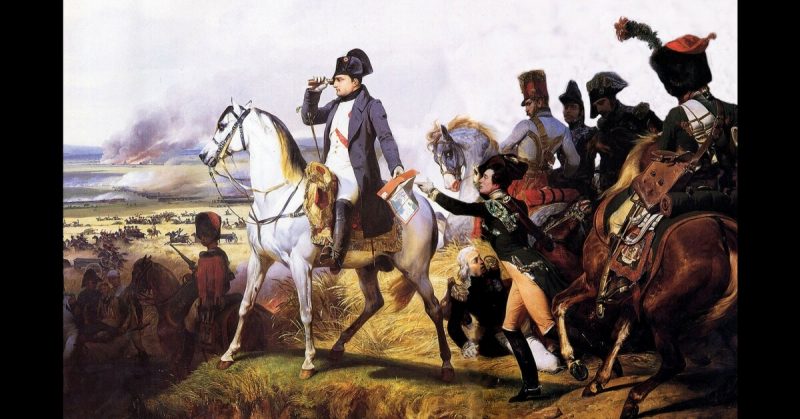Napoleon Bonaparte was one of the most successful generals in military history. Through skill as a military commander, he made himself the ruler of a vast but short-lived Empire.
A Military Education
Born in 1769, Napoleon joined the military academy at Brienne-le-Château in 1779, when he was less than ten years old. He was a capable student who spent his free time studying the great leaders of history.
Graduating in 1784, he moved on to the prestigious École Militaire in Paris. There he trained as an artillery officer. Gifted at mathematics and command, he excelled in his training.
On graduating from the École in January 1786, Napoleon became a second lieutenant in the artillery.
Fighting for the Republic
In 1789, Revolution shook France. Napoleon sided with the revolutionary Jacobins. After leading a volunteer regiment in the three-way conflict between revolutionaries, conservatives, and nationalists in Corsica, he was made a captain in the regular army.
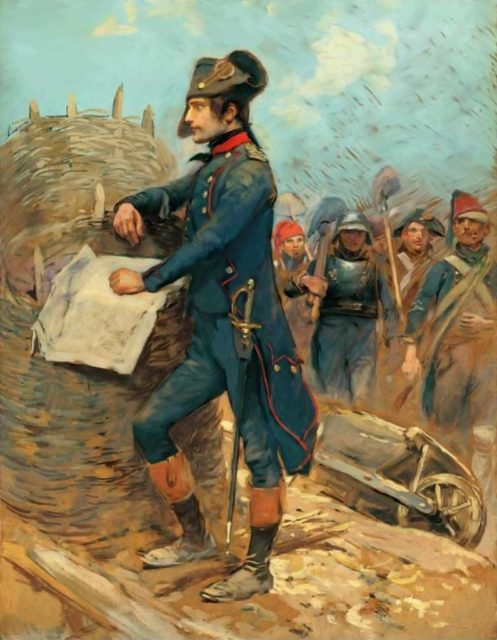
At the Siege of Toulon in 1793, he commanded the artillery against conservative rebels. His plans led to the capture of the city, during which he was wounded leading an attack.
Now a favorite of the government, he was made brigadier general. In October 1795, he used quick thinking and tactically placed artillery to quell rioters threatening the government in Paris.
The Italian Campaign
In 1796, Napoleon was given command of the French army in Italy. There, his tactical genius repelled the Austrian troops. He won dozens of battles, turning Italy into a series of French satellite states. In Paris, he was immortalized in plays, paintings, and poems; mainly due to his own propaganda newspapers.
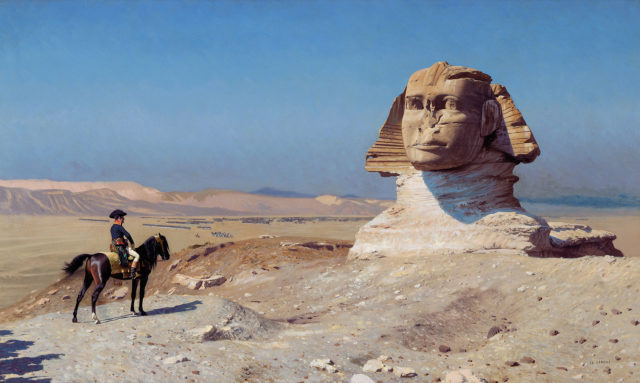
Egypt – Disaster on the Nile
Next came an expedition to Egypt in 1798. There, Napoleon’s aim was to control strategic British trade routes.
Initially, he won battles and made local alliances. In August 1798, however, the British Admiral Nelson destroyed the French fleet at the Battle of the Nile. Supplies could no longer reach the army. They retreated around the end of the Mediterranean, still looking for victories but becoming increasingly worn out. Napoleon abandoned his men to return home, arriving in time to put his own spin on the disaster.
Seizing France
Recruited by a group of political conspirators, Napoleon joined a coup in Paris. On November 9, 1799, they overthrew the government, in no small part due to Napoleon’s military power and reputation.
He became First Consul, theoretically one of three equal men running the government. In reality, he was in charge, and would later make himself Emperor.
The War of the Third Coalition
From 1803 to 1806, France faced opposition from the Third Coalition, an alliance that included Russia, Austria, and Britain.
Despite the French Navy’s defeat by the British at Trafalgar, Napoleon won the war. He repeatedly beat his opponents on land, finally smashing the combined Austrian and Russian armies at Austerlitz – possibly his greatest victory. It led to the breakup of the Holy Roman Empire.
The War of the Fourth Coalition
A fourth coalition was now formed, with Britain, Prussia, and Russia the leading participants. This time Napoleon beat them within a year. He delivered the knock-out blow against the Russians at the Battle of Friedland in June 1807. The next month, the Treaties of Tilsit were signed. It created peace with Russia and humiliated Prussia, which was forced to hand over extensive lands to the French.
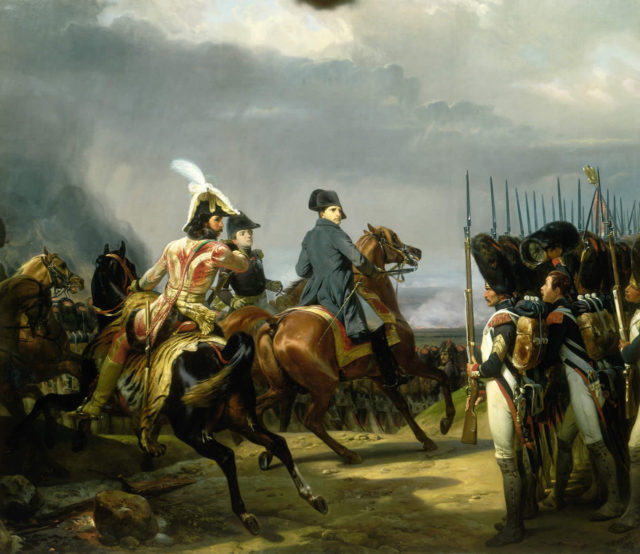
Peninsula War
Next came war in the Iberian Peninsula. To ensure cooperation in his blockade of Britain, Napoleon turned his ally Spain into a satellite state under his brother and invaded Portugal. It led to a protracted campaign, as Spanish irregulars resisted French rule while British troops landed to liberate Portugal. Unable to commit all his time to fighting there, Napoleon often left the Peninsula War in the hands of subordinates. Faced with General Arthur Wellesley, later made the Duke of Wellington, the French were pushed back.
War of the Fifth Coalition
In 1809, Austria joined with Britain in the Fifth Coalition. While the war raged on in Spain, Napoleon headed east to fight the Austrians. He smashed them at Wagram and once again forced a humiliating peace on his enemies. Along the way he lost a battle at Aspern-Essling, proving to the world he could be defeated.
Invasion of Russia
In 1812, Napoleon over-reached himself. When war broke out with Russia, he marched a vast army across the continent to invade. The Russians withdrew, scorching the land behind them. Despite beating the Russians at Borodino, Napoleon was forced to retreat. A lack of supplies and the harsh winter destroyed his army.
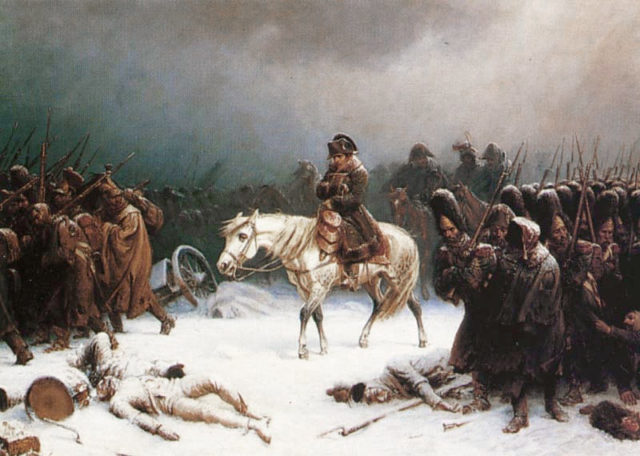
War of the Sixth Coalition
Emboldened by France’s defeat, the Prussians threw off the Treaties of Tilsit and joined the sixth coalition with Austria, Britain, Portugal, Russia, Spain and Sweden.
By now, Napoleon’s faculties were in decline. He was physically and mentally run down. His once sharp mind resorted to brute force tactics.
The British and their peninsula allies invaded France from the south. The others came in from the east. Although Napoleon conducted a valiant fighting retreat, it was too much. The men around him forced him to stand down so they could negotiate peace. He was sent into exile on the Island of Elba in the Mediterranean.
The Hundred Days
Napoleon still fought one last campaign. In 1815, he returned to France, to jubilation from many. He raised a fresh army to take on the British and Prussians in what became known as the Hundred Days. Beaten in a close fought and bloody struggle at Waterloo, his military career finally ended.
Again he was sent into exile this time on the distant Atlantic island of St Helena. Napoleon died in 1821, far from the country he had fought for so effectively. The Empire he had built had been dismantled by his enemies and the monarchy he fought against were restored.
Sources:
Alan Forrest (2011), Napoleon.
Robert Harvey (2006), The War of Wars: The Epic Struggle Between Britain and France: 1789-1815.
Alistair Horne (1996), How Far From Austerlitz? Napoleon 1805-1815.
